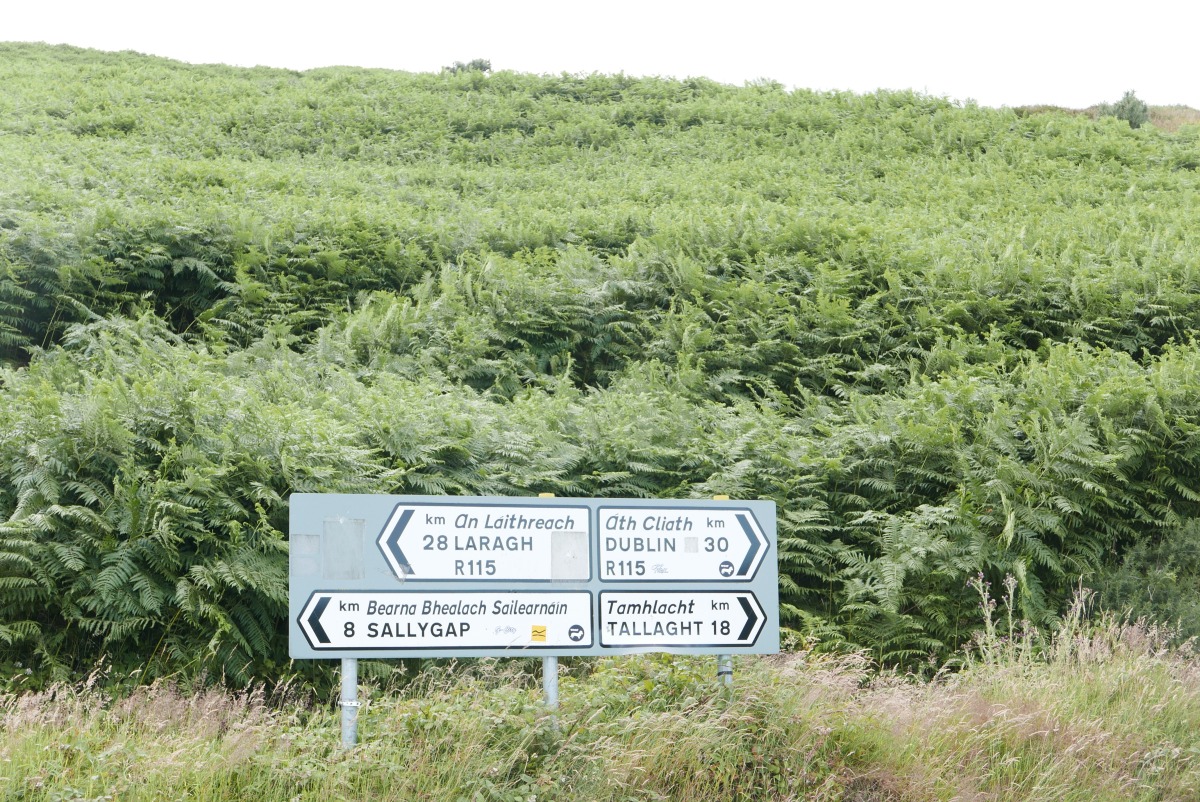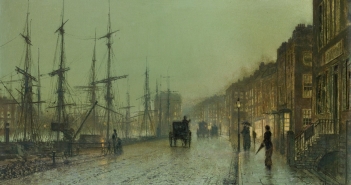Margaret didn’t like Walls, so why had she agreed to go walking with him in the mountains, and afterwards for a drink in a remote hotel bar? She had no self-control, she broke all her promises, she was weak and gormless. Flaws she contemplated, unlacing her boots at the fireplace.
“You should take off your socks too,” said Walls. “So that your feet dry off properly. Hang them off the mantlepiece, here.”
“Can we just do that?”
“Do you think we have to behave ourselves in this dump?”
Margaret smiled with warm disapproval. It wasn’t a dump, but she liked that he wanted better for her. She felt nice; she felt a sense of belonging. It was the end of December and it was a strange, antique hotel – empty, save for some old people at the collapsing little bar. The chairs shook. The evergreen strung along the mantlepiece looked feeble, picked clean by time, and even the fish in the boxes on the walls were dead.
“Evening.” A narrow-faced unsmiling man lowered a tray of hot ports to their table.
“Thank you, Sir,” said Walls. “Hits the spot – we feel we deserve it, too. We were out at Glendalough today, hillwalking with the best of them. Busy, here, this time of year?”
As the men found things to say Margaret cupped the port in her hands and dipped her nose to the bitter scent of liquor, lemon and cloves. She took a long drink, gazing affectionately around. The empty floral armchairs sat facing each other, backs reclining, arms outstretched as if caught in a ghostly confab. A grandfather clock sounded. The clock was strict, censorious, like a clacking tongue.
“It’s just so pleasant here.”
“It’s a nice place to come and disgrace yourself anyway.” Walls picked up The Shooting Gazette and read from a story about gundogs and winter grouse, making Margaret laugh. He propped the ankle of his desert boot up on his bulky knee and leaned back, testing all the strength of his chair. His legs were long and sturdy. How much were the rooms here anyway? She didn’t have to decide on anything yet. Margaret gulped her port, sinking back, sinking further inside an evening she’d never imagined she’d agree to.
On Christmas Eve she’d sat on a kerb on Dawson Street with her bags of shopping spread around her and into her phone typed: “Not only do I not love you, I don’t even like you, now get away from me.” She sat in the sleety cold, reading back through all their texts: the block paragraphs of his voluble accusations alternating with her neatly edited retorts. She did not feel safe. The shadows of ruthless passers-by bore over her, feet thumped, her ass froze on the cold stone.
Margaret pressed send, then put up her furry hood and fled the streets. Their love was over, and it hadn’t even been. On Christmas day, she kept her phone switched off for discipline with the benefit of also torturing him. On Boxing Day, she turned back on her phone to face three new emails from him. One sad belated Groupon offer for ice-skating – even the offer had expired. A press release for a pantomime, subject headed ‘Matinée with me?’ Then a sonnet, typed into the body of his email and evidently authored by him too in some dismal late-night rage: the couplet ended with the words ‘dishonour!’ and ‘suicide?’. (His punctuation).
Then on the 27th of December, she wrote that she hoped he had had a good Christmas. He wrote back that it was awful. ‘Awful’, he wrote. ‘I’m sorry,’ she replied, not knowing what for. On the 28th they chatted all day about themselves. Now we find the former soulmates on the 29th December in a hotel with buffalo horns displayed in the creaking hallway – something about the Boer War, the unsmiling concierge had told Walls – and sullen photographs of aristocrats in sporting gear. Why had she come all this way? Because that morning she’d opened her curtains to a bright winter sky booming down on her. ‘Beautiful day’, she texted, and exactly an hour later she pulled into the traffic island opposite Donnybrook church, grinning and waving at Walls as if he was a friend. He got into the car, bulky and ungainly as the wrong jigsaw piece. He looked so suspect, checking around him – always guilty, stigmatised by some certain yet unclear wrongdoing. She liked the boyish glint, the boyish smile – he was terrible, incorrigible – he was her punished pupil. They got along well. They both liked walking in the mountains, they liked wine, books, planes. He liked politics, man’s worlds. Both liked the idea of causing trouble – of escalating something, shocking other people. He edited a little online magazine in his spare time and she’d been his intern and his girlfriend the past year. His protégée, unpaid apprentice, the weirdo in the corner of his study eying him while he worked, blushing at his glances, her amorous eyes – though never undressing him there and then. Their fantasies remained just that, ethereal, abstract ideas transacting between them, through a fug of newspapers, laptops, coffee cups, vape and sandwich wrappers. All physical sex was had after dark and in the dark. About once a week, or twice a week, one of them would say something pointed and disruptive and they would argue. Arguing would last hours or days. Arguing became yelling, slamming, became toxic waste – life was flammable and unhinged, something she couldn’t control. Once, on holidays abroad, he drove her drunk late and night and told her he had the power to kill the both of them. He speeded up the car and scared the shit out of her. Then he slowed down the car. She never asked him about it afterwards, she told the story only to herself, she reasoned with its oddness; it was all bluster, wind-up. A joke – just a stupid joke.
At Glendalough, the surrounding hills were plush and velvety with deep colours, and snow lit up the mountain peaks. The cold air blanched her face as the soles of her shoes gripped the railway sleeper tracks along their path. They chatted happily, normally, like decent people, offering nods to ruddy-cheeked women and their dogs. The sky grew dark and the hikers dispersed, leaving them alone in the mountain ranges. She felt shy and elated; she wondered if they would touch. When her ankle turned on a rock along the track, she almost fell, but he grabbed her wrist and held her glove, looking at her with tender fright. After that she let him hold her ungloved hand.
The man came carrying two more ports, and a Christmas cake, encased in white marzipan, with little mince pies in paper cases laid out on a doily, their pastry tops dusted with icing sugar. Margaret spooned whipped cream all over a mince pie and ate it.
“I adore whipped cream! I think whipped cream must be my greatest pleasure. If I had cream every night I’d be happy for the rest of my life.” She licked her lips of cream and sugar powder.
“We could actually eat before we go,” he said.
“We could. But the ice. Would the ice be dangerous?” She had no interest in the answer to her question, a formality in the resistance she would need to provide. Her limbs felt heavy, her skin baked in the heat of the flames.
“They have a table, if we want.”
“Oh, you already asked them?”
She tilted her head as if she was considering something. “I suppose I am very hungry.”
The grandfather clock ticked, jaunty, like horses galloping. Tick-tick-tick-tick-tick-tick-TICK, it went. So percussive, so repetitive it couldn’t possibly signal change, or progress.
“Leave your boots.”
The dining room was a solemn rectangle with every table set and nobody there. Serviettes were ironed into fans, candlesticks loomed unlit. Margaret admired a very big fork, and touched the white table cloth as if it was a sheet of gold. “This is all so nice!” She gave a histrionic shiver and at this cue, Walls took off his suit jacket and tossed it on her shoulder. The jacket buried her in warmth, and as the chill eased from her body a big bottle of red wine came. The bottle did seem bigger, fatter than an average bottle, and she assumed it was expensive. Getting home was going to be impossible, though they both had a history of reckless driving – she was chaos, did not take care with things. Food arrived with the rapid pace of an establishment with very little to do: scrolls of ham with out-of-season melon cut in half moons, thick slabs of game terrine. A blue fish with a crispy eye was placed in front of Walls and for Margaret, a duckling’s breast stewed in dark juices.
“How are we going to make it back? I’m so tired for driving,” Margaret announced after a time.
“Look, the rooms are fine, if you want.”
“You think.” She let her voice trail off – she would not contribute any more to this discussion.
“Only €75 a head, dinner included,” he said. “And it’s on me.”
“You don’t have to.”
“I owe you anyway.”
“That’s separate.”
“Sure.”
He must have been referring to the fee he normally paid for two articles, for which she had invoiced him, and which he still hadn’t paid her for. She sliced a piece of meat in two and ate quickly and unhappily the morsels on her plate. Next week, she’d have to send him the invoice again, for the third time. They sat in silence for too long. Walls sloshed wine into her glass, and she drank as much as she could in a mouthful.
“Let’s order dessert. Apple and rhubarb pie, sticky toffee pudding, blancmange, or – oh goodie. Baked Alaska. Or did you see the cheese on the trolly earlier? I think I saw cheese.”
The door brushed over the carpet, and in came the serving lady and behind them, a tall fair-haired couple in handsome coats. Margaret’s head lifted and turned as the man and the woman crossed the room. Her eyes were tugged, locked, as the man pulled off his hat to reveal a face that was as familiar to her as it was intimidating, in its classic lines of beauty and clear, healthy skin. His name was Antonio, and he was the tech millionaire who had taken her to the party where she first met Walls. Millionaire, or billionare. Secret investor – someone of great worth, great wealth. She didn’t care about wealth, but. Antonio, she knew, moved easily in the world, had experiences. He had fulfilled more of his dreams than, for instance, Margaret.
Walls was saying something.
“Sorry, what?” she was dazed. “Sorry – It’s – did you see, who just came in?
Antonio and the woman had seated themselves at the furthest corner, leaving a barricade of empty tables between them and the suddenly inferior, suddenly scruffy Walls and Margaret. Margaret touched her hair, damp and unbrushed, and seized a silver spoon to check her reflection – she had the face of a bumpkin, nose, lips, eyes blown up. She tilted in her chair, trying to catch Antonio’s eye while also paying Walls extra attention.
“Did you see the dessert menu?”
“All I saw was you staring at him.”
As ever, it came in a single rough blow.
“I wasn’t – ”
“You were.”
“But – ”
“You were staring at him like a little girl in a shop window.” Her cheeks were hot, and her heart beat in a way that hammered, weighted her. Superglued to where they sat, stitched into the furniture, she felt that life would run on, this way, facing Walls, answering to Walls. She looked around her, so as not to have to look at him, and Antonio turned around just in time.
“Ah!” He said, and stood from his seat.
Both men faced each other, chests puffed as they shook hands. Antonio kissed Margaret’s cheek, and the other woman and Margaret kissed politely. “Pearl,” she said. “Pearl,” Margaret said, forgetting, for a moment, her own name. Pearl and Margaret talked for a few minutes about their jobs.
“I’m hoping to specialise in equine law,” Pearl finished.
Margaret dropped into her chair to see puddings and cheeses all laid out in front of her.
“This is really great” said Walls. “I’d have to say the food has really been first class, you wouldn’t have thought it.” Hunched forwards, he sawed into his tart. “Taste, here.”
Margaret recoiled. Like a child she shut her lips to the advance of his laden fork.
“What? Oh, are you annoyed or something? Because I teased you for looking at Antonio? Come on, weren’t you? Don’t tell me you weren’t staring at him doe-eyed – don’t tell me you’re not mesmerised. I don’t blame you – he’s a handsome guy. You know, who cares. I’m not annoyed with you. Are you? Are you annoyed with me or something?”
“No.” Margaret smiled politely, and then did something strange. She asked the serving lady for the bill, and she paid it using her credit card. She zipped up her wallet, threw his jacket on his lap.
“That was very generous,” he said.
“I’m feeling generous.” An eerie pause. She started to laugh. “Because I’m so happy. Really, you have no idea how happy I am. Because I remembered something, just there. I’ll never, ever have to do this again. I’ll never have to see you again. You have nothing to do with me anymore. You are a hole – you don’t exist. Oh, this is a relief” She tore a handful of grapes off a branch and popped the grapes between her laughing jaws. “And you know maybe I was looking over there. Maybe I wasn’t. I can actually look at people, ha ha, I can look at whoever I want, whenever.”
Margaret hacked out a wedge of yellow cheese and lined up three crackers. “And you know I will think about all these other people, other men maybe. I might even kiss them too, on the lips.”
“Yeah!? he goaded.
“Yeah! I will probably go to bed with them!” Margaret flashed her eyes at her defeated lover. “And then, well, who knows what might happen? Once I’m alone with them.” She leaned over a debris of cheese rinds and blue crumbs and broken biscuits. “I’ll take my clothes off, everything. One by one. Down to my underwear, and then I’ll sit on the bed, with no clothes on, and they will look at me. Oh! I am so young, and you are not. I am so young and free, and you are so irrelevant!”
Should she go on. Tell him all the things that she could do, with these imaginary men, or just carry on insulting him, get all the bile out on the table. No, someone had to drive them home. Margaret was over the limit. And she knew enough not to eliminate the fear that he could try and kill her, or at the very least, threaten to do so, which is also blood-chilling. She drew in a series of deep, imperious breaths, then picked up the wine bottle and upturned it in her glass. She drank the rest and sat up.
“I’ve to go.”
“Go,” he repeated. “Just go, just like that.”
“Yes, now.”
“And you probably want to go home without me, do you.”
“Oh god yes.”
“I booked a room. But you don’t care.”
“Nope.”
“That isn’t very nice – I thought we.”
“Nope. Cut it out now. I want to go. Now. And you should drive, because I’m too drunk. And I don’t feel like driving.”
Margaret handed Walls the key to her car, or rather, her mother’s car.
In the dark of the courtyard, he turned the key. The engine breathed, and omitted a lengthy energetic death rattle, then cut out. He tried again. It cut out again.
“Look,” he said. “I know you think I was out of order –”
“Start the car.”
“I was just going to say.”
“Start the car.”
He stamped his foot and the sound of pumped gas wheezed, then thinned into the night air. Tree branches crouched behind them.
Later, under her duvet, fully clothed and shivering with adrenaline, Margaret’s head raced. With outrage, disbelief. Revulsion. She felt excited by the hate in her, enriched with its potency. She was free and alive, shot of him – what had she been thinking; of course, he never would have killed her, not like that.
New year came, like a homecoming, a beneficent place of safety. And as the years passed, she still triumphed in the afterglow, the feeling of survival. But he came with her, he lived in her. His voice was in her mind, talking and lecturing and murmuring and making her laugh. It was his face that hovered in her dreams, his eyes that spotted her in a crowd, or narrowed on her in quiet moments. ‘Get away from me!’ But he wouldn’t get away. She couldn’t get away. She couldn’t get him out.




